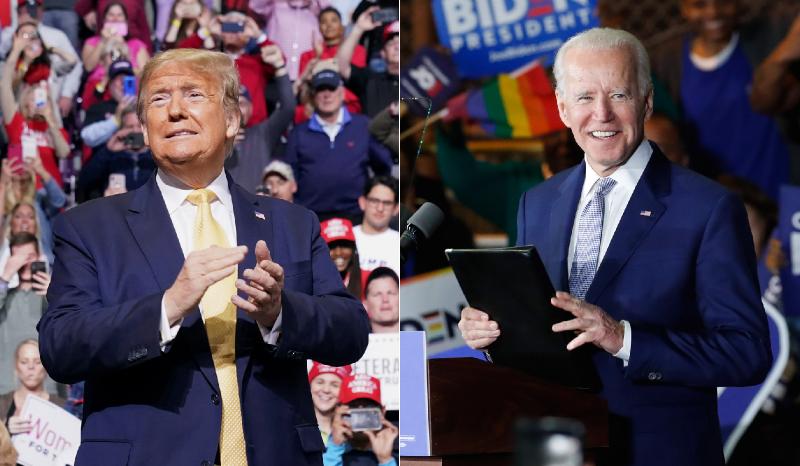Biden & Trump -- Democrats' Election 'War Games' Delegitimize November's Election | National Review
By: David Harsanyi (National Review)



A recent deep dive in the Washington Post's Outlook section, "What's the Worst That Could Happen?" exploring various potential outcomes of the 2020 presidential election, found that in "every scenario except a Biden landslide, our simulation ended catastrophically." According to the Post, any other outcome is destined to spark "violence" and a "constitutional crisis."
Or, in other words, nice country you got there . . .
Every assumption in the article, written by Rosa Brooks, a Georgetown University law professor and co-founder of the Transition Integrity Project, is awash in the conspiratorial paranoia that's infected the modern Democratic Party. It's a world where Trump officials — played, quite implausibly, by Joe Biden partisans Michael Steele and Bill Kristol — are "ruthless and unconstrained right out of the gate" but the genteel statesmen of Team Biden "struggled to get out of reaction mode." It is place where Republicans aren't only reflexively seditious and autocratic, but a "highly politicized" Supreme Court tries to steal the election.
In their "war game" scenarios, however, it's the Democrats who refuse to accept the will of courts to adhere to the constitutionally prescribed system rather than hysteria, and it's the Democrats who wishcast the wholly imaginary "popular vote" into existence.
One of the scenarios, we learn, "doesn't look that different from 2016" — a contest in which, it must be pointed out, not one vote has been proven to be uncounted or altered. In that outcome, America is confronted with "a big popular win for Mr. Biden, and a narrow electoral defeat."
In the real world, incidentally, that scenario is called a "Trump victory."
In the fictional war game, however, John Podesta, playing the role of Biden, contends that his party won't let him concede the race, and instead alleges "voter suppression" — the catch-all go-to every time a Democrat loses — and persuades the Democratic governors of Trump-won states such as Wisconsin and Michigan to send pro-Biden electors to the Electoral College. In the meantime, California, Oregon, and Washington threaten to secede from the union if Trump takes office. The Democratic House unilaterally names Biden president. "At that point in the scenario," the New York Times' Ben Smith explains, "the nation stopped looking to the media for cues, and waited to see what the military would do."
This scenario is what a real-life "coup" might resemble. It is, needless to say, utterly insane that Democrats would destroy the nation's long-standing and peaceful transition because they refuse to accept the mandated process of electing the president. All of which is to say the proactive — and retroactive — delegitimization of the Trump presidency has been a successful four-year project. It permeates the entire Democratic Party's information complex.
First, Democrats convinced millions of Americans that a handful of inept and puerile social-media ads were enough to overturn a presidential election in the most powerful nation on earth. By 2017, a majority of Democrats believed that vote tallies had been tampered with by Russians, somehow without a trace of evidence.
Since then, Democrats have been working to convince themselves there is no legitimate way in which Trump could win the election again. A large number of high-profile left-wing columnists have laid the groundwork to make this case and high-profile politicians have joined them. Hillary Clinton's advice to Biden not long ago was to not concede defeat on the night of the November 3 election no matter what happens. In January during the impeachment trial, Representative Adam Schiff said, "The President's misconduct cannot be decided at the ballot box, for we cannot be assured that the vote will be fairly won." House speaker Nancy Pelosi has noted that "Let the election decide'" is a "dangerous position" position because Trump is already "jeopardizing the integrity of the 2020 elections."
"It's worth pointing out that *almost* no one thinks Trump will actually win more votes," Chris Hayes told his followers not long ago. "I think if he wins the electoral college and loses the popular vote *again* you're looking at the worst legitimacy crisis since secession."
A far bigger crisis for the United States is that liberal pundits tell their audience that the method of winning an election in the United States, one that every president in history of the country relied on, should be considered a crisis of legitimacy.
What is worth pointing out as well is that the dynamics of the presidential election would be completely different if the popular vote actually existed. But candidates do not compete for the popular vote, so they can neither "win" nor "lose" it. If they did try to win the popular vote, they would cater to the largest population centers, and no one else, and elections would look very different. I'm not sure that that setup would work out for Democrats exactly as they imagine, but it doesn't matter. A popular vote undercuts federalism, one of the foundational ideas of the Founding. And that's the point.
If you haven't noticed, it's working. A recent USA Todaypoll found that 28 percent of Biden's supporters say they aren't prepared to accept a Trump victory as "fairly won," and 19 percent of President Trump's supporters say the same about a potential Biden victory. So a significant minority of American voters don't believe the next election will be legitimate before it has even been conducted. What happens when every long line at the polls and every Facebook meme and every delayed mail-in ballot is turned into a nefarious plot by the enemy to snatch democracy from the rightful winner? It's going to be ugly, indeed. If their "war games" are to be believed, that's what Democrats are counting on.
Editor's Note: An earlier version of this article stated that "almost half" of Americans doubt the legitimacy of the next election. It has been updated to more accurately reflect the poll numbers it cites.




